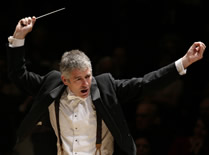Beware, it’s habit forming. I am referring to classical music programming at White Horse Black Mountain, the venue recently opened by Asheville native Bob Hinkle and his wife Kimberly Hughes. Prior to opening the cabaret, Hinkle spent thirty years in the entertainment business as a performer, producer, personal manager and record company president while Hughes spent fifteen years based in New York and singing professionally.
The entertainment at White Horse Black Mountain includes bluegrass and other popular genres, with many Tuesday evenings devoted to Irish music. But White Horse Black Mountain also features local classical groups such as the Opal String Quartet and Pan Harmonia. Classicopia appears at the cabaret regularly, and this “Four-Hand French” concert was only the latest in what promises to be monthly Classicopia chamber music at the relaxed venue. Relaxed but respectful; patrons are seated cabaret style eating catered sandwiches and drinking local draft beer but everyone, staff and patrons, is quiet during the music.
For this concert, pianist Philip Liston-Kraft and Daniel Weiser performed music for one piano four hands. Only the French regularly used this combination for serious composition. With a few exceptions (notably the Schubert F minor Fantasia), a concert of four-hand music means original compositions by nineteenth and twentieth century French composers or transpositions of work written for other ensembles, and this concert followed that pattern. Liston-Kraft played primo in works by Claude Debussy and Maurice Ravel. Weiser played primo in works by Gabriel Fauré, Francis Poulenc and a transcription of George Gershwin.
From the beginning notes of the “Berceuse” that opens Fauré’s Dolly Suite, it was clear that Liston-Kraft and Weiser developed a rapport when they both lived in New England and played together regularly. They merged their playing into a tightly knit unity that is one of the benefits of two artists sitting on one bench in body contact. For instance, in the closing bars of the contrapuntal fifth movement “Tendresse,” you could see body movements that coordinated the two players into a coordinated ritardo. The thick harmonic texture was often the only indication that more than two hands were playing.
During every Classicopia concert, Dan Weiser provides a running commentary on the works. In discussing Debussy’s Petite Suite, he spoke of the kinship Debussy felt to Symbolism. Several movements of Petite Suite relate to poems by Paul Verlaine. The first movement “En Bateau” conjures up moonlight on the water. The poem says “l’esquif en sa course brève/File gaîment sur l’eau qui rêve” (the skiff in its brief race/spins merrily on the dreaming water). At the heart of poetry is an economy of expression. That economy is also at the heart of this piece. It is hauntingly beautiful, and more effective in its original form than when transcribed for orchestra.
Poulenc’s short Sonata for Piano Four Hands completed the first half of the concert. There are moments with a tricky tangling of arms that Weiser solved by standing up from the bench to attack chords from above while Liston-Kraft’s hands moved into the primo territory. Four-hand work requires logistic dexterity along with musicality.
Ravel’s Mother Goose Suite, in my opinion, is one of the few pieces of French four-hand music that was improved in becoming a piece for orchestra. The original four-hand version can only use pentatonic scales, the mixolydian mode and jazzy ninth chords to give its coloration, while the orchestral version adds instrumental color. Ravel was an excellent orchestrator, and the four-hand version seems to me to be a Mother Goose with plucked feathers.
The final work on the program was George Gershwin’s Rhapsody in Blue, as arranged by Henry Levine for one piano four hands. The players tackled this quintessential American composition in a manner that was edgy when called for, lyrical at other moments such as when the final section bursts out with its unforgettable romantic theme. Jazz originated in New Orleans with a fusion of African-American rhythms and traditional French band music, and France naturally adopted jazz as a prodigal son come home. More than fifty paying customers felt that the jazzy American Rhapsody was quite appropriate to conclude a program whose title was “Four-Hand French.”











